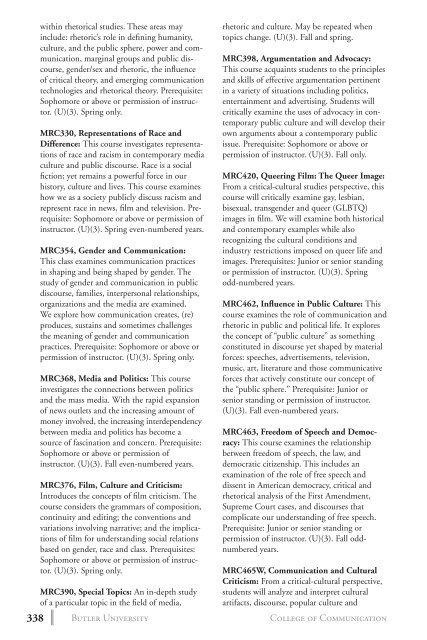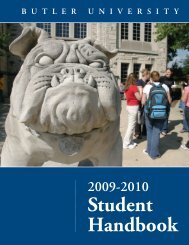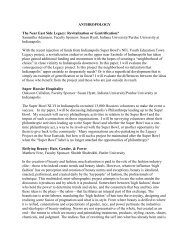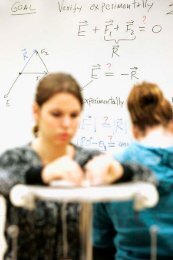2 0 1 3 bulletin - Butler University
2 0 1 3 bulletin - Butler University
2 0 1 3 bulletin - Butler University
Create successful ePaper yourself
Turn your PDF publications into a flip-book with our unique Google optimized e-Paper software.
338<br />
within rhetorical studies. These areas may<br />
include: rhetoric’s role in defining humanity,<br />
culture, and the public sphere, power and communication,<br />
marginal groups and public discourse,<br />
gender/sex and rhetoric, the influence<br />
of critical theory, and emerging communication<br />
technologies and rhetorical theory. Prerequisite:<br />
Sophomore or above or permission of instructor.<br />
(U)(3). Spring only.<br />
MRC330, Representations of Race and<br />
Difference: This course investigates representations<br />
of race and racism in contemporary media<br />
culture and public discourse. Race is a social<br />
fiction; yet remains a powerful force in our<br />
history, culture and lives. This course examines<br />
how we as a society publicly discuss racism and<br />
represent race in news, film and television. Prerequisite:<br />
Sophomore or above or permission of<br />
instructor. (U)(3). Spring even-numbered years.<br />
MRC354, Gender and Communication:<br />
This class examines communication practices<br />
in shaping and being shaped by gender. The<br />
study of gender and communication in public<br />
discourse, families, interpersonal relationships,<br />
organizations and the media are examined.<br />
We explore how communication creates, (re)<br />
produces, sustains and sometimes challenges<br />
the meaning of gender and communication<br />
practices. Prerequisite: Sophomore or above or<br />
permission of instructor. (U)(3). Spring only.<br />
MRC368, Media and Politics: This course<br />
investigates the connections between politics<br />
and the mass media. With the rapid expansion<br />
of news outlets and the increasing amount of<br />
money involved, the increasing interdependency<br />
between media and politics has become a<br />
source of fascination and concern. Prerequisite:<br />
Sophomore or above or permission of<br />
instructor. (U)(3). Fall even-numbered years.<br />
MRC376, Film, Culture and Criticism:<br />
Introduces the concepts of film criticism. The<br />
course considers the grammars of composition,<br />
continuity and editing; the conventions and<br />
variations involving narrative; and the implications<br />
of film for understanding social relations<br />
based on gender, race and class. Prerequisites:<br />
Sophomore or above or permission of instructor.<br />
(U)(3). Spring only.<br />
MRC390, Special Topics: An in-depth study<br />
of a particular topic in the field of media,<br />
<strong>Butler</strong> <strong>University</strong><br />
rhetoric and culture. May be repeated when<br />
topics change. (U)(3). Fall and spring.<br />
MRC398, Argumentation and Advocacy:<br />
This course acquaints students to the principles<br />
and skills of effective argumentation pertinent<br />
in a variety of situations including politics,<br />
entertainment and advertising. Students will<br />
critically examine the uses of advocacy in contemporary<br />
public culture and will develop their<br />
own arguments about a contemporary public<br />
issue. Prerequisite: Sophomore or above or<br />
permission of instructor. (U)(3). Fall only.<br />
MRC420, Queering Film: The Queer Image:<br />
From a critical-cultural studies perspective, this<br />
course will critically examine gay, lesbian,<br />
bisexual, transgender and queer (GLBTQ)<br />
images in film. We will examine both historical<br />
and contemporary examples while also<br />
recognizing the cultural conditions and<br />
industry restrictions imposed on queer life and<br />
images. Prerequisites: Junior or senior standing<br />
or permission of instructor. (U)(3). Spring<br />
odd-numbered years.<br />
MRC462, Influence in Public Culture: This<br />
course examines the role of communication and<br />
rhetoric in public and political life. It explores<br />
the concept of “public culture” as something<br />
constituted in discourse yet shaped by material<br />
forces: speeches, advertisements, television,<br />
music, art, literature and those communicative<br />
forces that actively constitute our concept of<br />
the “public sphere.” Prerequisite: Junior or<br />
senior standing or permission of instructor.<br />
(U)(3). Fall even-numbered years.<br />
MRC463, Freedom of Speech and Democracy:<br />
This course examines the relationship<br />
between freedom of speech, the law, and<br />
democratic citizenship. This includes an<br />
examination of the role of free speech and<br />
dissent in American democracy, critical and<br />
rhetorical analysis of the First Amendment,<br />
Supreme Court cases, and discourses that<br />
complicate our understanding of free speech.<br />
Prerequisite: Junior or senior standing or<br />
permission of instructor. (U)(3). Fall oddnumbered<br />
years.<br />
MRC465W, Communication and Cultural<br />
Criticism: From a critical-cultural perspective,<br />
students will analyze and interpret cultural<br />
artifacts, discourse, popular culture and<br />
College of Communication
















